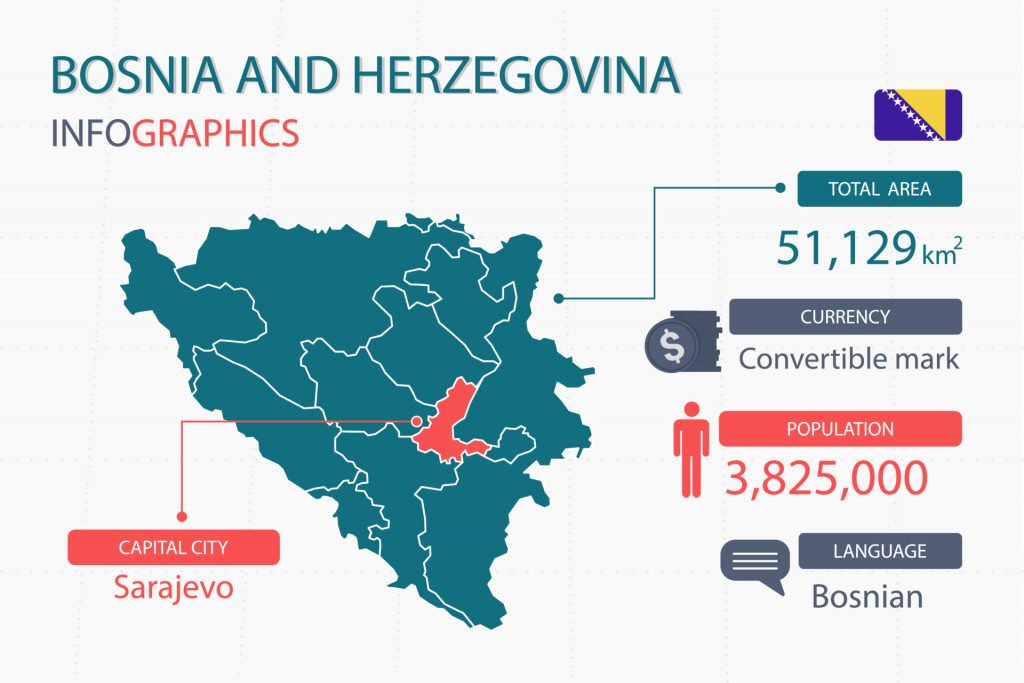The origins of the Bosnian Language
Bosnian refers to a standard variety of Serbo-Croatian used primarily by the Bosniak ethnic group. Other recognized standardized versions include Croatian and Serbian. It is spoken by about 2-3 million people depending on how ‘Bosnian’ is actually defined. It is the official language of Bosnia and Herzegovina and a recognized minority language in a number of other countries. It is considered mutually intelligible with the other standardized versions of Serbo-Croatian.
Bosnian has its roots in Shtokavian, the variety of Serbo-Croatian that is the most widely spoken dialect. Politically and culturally, it is customary to recognize Bosnian as a separate language compared to the other varieties even though, up until 1992, they all were treated as one language by most linguists. Native speakers of each variety, though, feel strongly connected with their language from a national identity perspective and as such, the naming of the variety of Serbo-Croatian that is spoken by certain groups of people in certain nations is quite a touchy topic.
There are a number of ways that Bosnian differentiates itself in a few different manners. First, Bosnian uses both the Latin and Cyrillic alphabet in daily use. Second, speakers of Bosnian tend to employ a larger number of loanwords due to culturally ties between Bosnian speaking communities and Islamic communities. Thus, a number of words coming from Arabic, Persian, and Ottoman Turkish are used in daily conversation, as these languages historically were related to Islam. As the national identities associated with each variety are further developed and the languages evolve, further differences will undoubtedly present themselves.
The history of Bosnian can be traced back to its Serbo-Croatian roots. Serbo-Croatian is ultimately classified as a South Slavic language. Throughout history, Serbo-Croatian varieties have been known by different names based on regions and ethnic groups. Names ranging from Illyric, Slavic, Bosnian, Serbian, etc. were all used to describe it. Eventually, the term Serbo-Croatian was used in 1824 by Jacob Grimm, and this use became prominent among linguistic scholars.

Originally Serbo-Croatian has roots in Old Church Slavonic, a liturgical language in origin, but one that gradually became used for vernacular purposes in the areas in which it was prominent. Throughout the centuries, Old Church Slavonic evolved into a variety of dialects that would come to represent the Serbo-Croatian group of languages.
In terms of Bosnian itself, it became more of a standard language in the 1990s as opposed to Serbian or Croatian, which codified a national language in the 19th century. This delay was due to a number of reasons. First, the Bosnian elite living under Ottoman rule, while speaking vernacular Bosnian, mostly produced literature and publications in Turkish, Arabic, or Persian. Actual Bosnian works of literature were not as widely available, and thus there was not necessarily a need to have standard conventions for it. Second, there was not a national Bosnian identity formed until much later, compared to the Serbian and Croatian ethnic groups.
As a result of the previously mentioned factors, modern Bosnian truly began to take shape quite recently. With the influence of Turkish, Arabic, and Persian, modern Bosnian has incorporated loanwords from these sources, as well as their grammatical and phonological, into the language. Moreover, Bosnian draws from the Bosniak Renaissance that took place at the beginning of the 20th century, using certain ideas to inform public language policy.
Even as it gained recognition as a language, there is still controversy surrounding the actual name. Bosnian refers to the language used by the Bosniak ethnic group and not to the language of all Bosnians that live in Bosnia, who may also be Croats and Serbs. These ethnic groups tend to call the language that they used either Croatian or Serbian, as a matter of ethnic and cultural affiliation. Bosnian Croats, for example, would say that they speak Croatian. Insisting on such a distinction is a matter that is very close to the communal heart of the three ethnic groups.
Such political, cultural, and linguistic uncertainty and tensions have made it difficult for academic linguists, other scholars, and international organizations to classify the language. However, overall, the standard variety spoken in Bosnia by Bosniaks is recognized as Bosnian. Even those who disagree concede it to being called the Bosniak language.
Regardless of the controversy, the Bosnian language has been overall recognized from an international standpoint, even in other Serbo-Croatian speaking countries. For example, the Bosnian language is included in some schools in Serbia as an elective subject. Montenegro, where the official language is Montenegrin, also another standard variety of Serbo-Croatian, also officially recognizes the Bosnian language.
With such a complex history and such heated debate behind Bosnian and other Serbo-Croatian varieties, an understanding of the differences between all the languages as well as the history underpinning these differences is quite helpful for those who wish to connect with the people in these speech communities, whether it be for business or for pleasure.
VEQTA can provide you with a perfect Bosnian translator for your Bosnian translation, English to Bosnian translation and Bosnian to english translation for the your targeted locale. Our translations to Bosnian are created with your target audience in mind to meet your expectations.
If you need to translate Bosnian – Get in touch today!
A dedicated team of Bosnian translators who combines Experience, Specialized Subject Matter Expertise with best Translation Practices to deliver quality second to none.
Bosnian Document Translation
Bosnian Legal Translation
Bosnian I.T Translation
Bosnian Health & Fitness Translation
Bosnian Medical Translation
Bosnian Marketing Translation
Bosnian Financial & Accounting Translation
Bosnian Tourism & Travel Translation


